TunnelBear enjoyed quite a bit of popularity back in its prime days. The provider offered free and paid subscriptions, and still is, a flexible solution. So, the question of which provider to buy, TunnelBear or ExpressVPN, initially seems simple. Well, it’s not. You see, ExpressVPN is a marvelous provider. It has no free plans, so it’s a premium-only solution. This tells us volumes about its undeniable quality, impeccable security, fast speeds, and streaming capabilities. In today’s ExpressVPN vs TunnelBear duel, we’ll see which provider is better. So that you know, we’re using the paid version of TunnelBear.
Despite its free version being more popular, the premium version is fully unlocked. As a result, it would be fair to use that version instead. Our recent review of TunnelBear can tell you more about this provider. In this article, we’ll focus on the task at hand, which is a comparison between TunnelBear and ExpressVPN.
In other words, we’ll put these two through 9 extensive tests and count the scores at the end. The provider with the highest score wins. While we’re not always fond of mathematics, they sure help determine which provider is better. Now, let’s get on with the ExpressVPN vs TunnelBear analysis, shall we?
TunnelBear vs ExpressVPN: Apps & Ease of Use
VPNs must offer quality applications for all major platforms. Through them, you’re using the VPN, henceforth, the user experience must be top-notch. TunnelBear and ExpressVPN are similar in a way that they offer applications for four major platforms:
- Windows
- macOS
- Android
- iOS
We intentionally left out Linux because TunnelBear doesn’t support this system. In fact, these four platforms are the ONLY ones that the provider works on. Of course, it offers a browser extension for Firefox, Chrome, Brave, and Edge but this extension is bare-bones.
ExpressVPN takes several steps ahead. It works on plenty of Linux distros, even including a more than bog-standard extension for all browsers. It’s a full-fledged VPN extension for Chrome, Edge, and other browsers that protects ALL your traffic.
Other than that, you’ll find ExpressVPN’s native clients on Apple TV, Firestick TV, routers, Chromebooks, and other devices/systems. We’re thoroughly impressed with its support for gaming consoles and generally device support. The provider, in fact, excels in this regard.
Simultaneous connections are another thing to be aware of. ExpressVPN is capped at 8, which is a solid number. Here, TunnelBear strikes back, slapping ExpressVPN with unlimited connections – take that! But does this make TunnelBear better than ExpressVPN? We can’t say yet.
TunnelBear
We’ll tell you one thing – TunnelBear’s applications rock! Look at the app below and you’ll see fine craftsmanship and attention to detail. The app represents sort of a playground for a bear that moves to the country you connect to by digging out the ground.
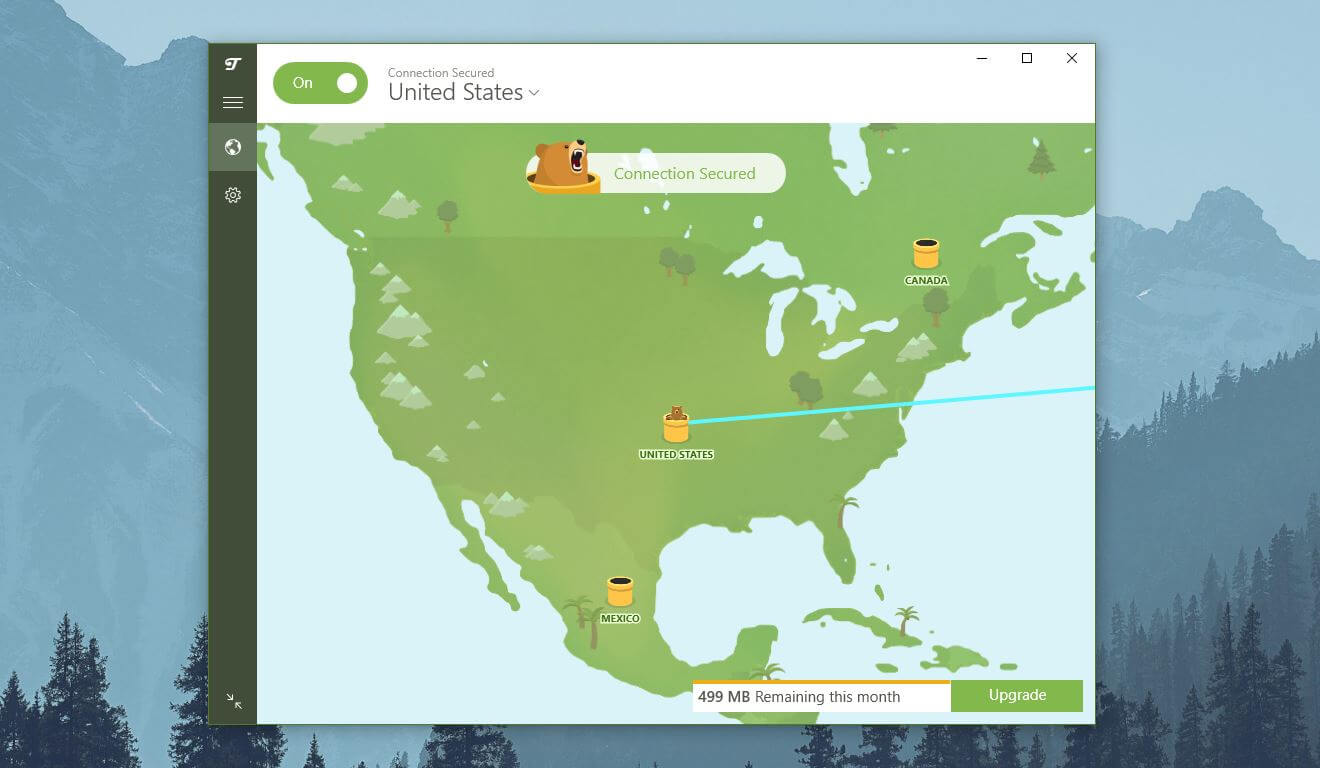
For connection, you’re using a world map, which looks terrific and can easily be moved around. One-click on the country is all it takes to connect. Alternatively, you can use the server list next to the connection button in the upper portion of the screen.
But hey, using the world map is so much better. The left side is reserved for Settings, which can be opened using the Cogwheel icon. The Settings menu is more “streamlined” and looks “classic”, so no bears are involved. It’s intuitive and easy to get around as well.
We must mention that the VPN preserves the level of quality even on mobile devices. iOS and Android apps look identical, with all the fancy animations and stuff. We’d venture to say it’s among the best-looking free Android VPNs as well – great job.
ExpressVPN
ExpressVPN’s simplicity combined with the complexity behind the curtains is phenomenal. The provider’s infrastructure is vast, complex, and with cutting-edge technology, yet, the VPN packs everything you need in a neat application for all platforms.
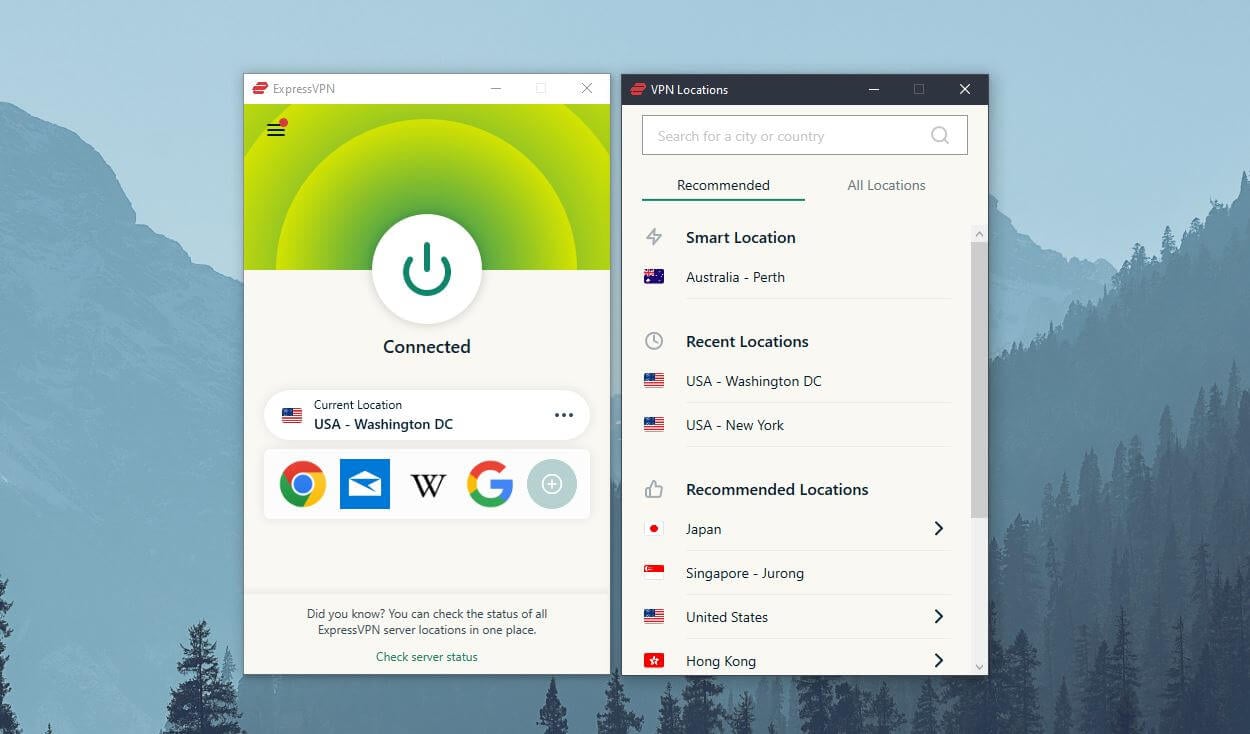
It’s a small window with a big connection button in the middle. Click once and in a second, the VPN will connect. The server list is done wonderfully too, as you even have a search bar to find the exact country or city you want. Next, we have this Smart Location option to connect to the fastest server.
We like its Settings menu, which can be accessed from the three horizontal lines in the top-left portion. You’ll find all VPN-related options in two menus. One menu is reserved for protocols while the other houses a kill switch, split tunneling, and other settings.
Much like TunnelBear, ExpressVPN’s attention to detail transfers to mobile apps. You’ll find they look the same across all platforms, so you don’t feel like you’re using another provider. It’s the same old (but good) app that you’ve come to love – or hate – depending on your preferences.
Who Wins?
The first ExpressVPN vs TunnelBear round started pretty well for both services. Unlimited connections and ease of use are TunnelBear’s characteristics. ExpressVPN’s ease of use is even better perhaps and it offers way better compatibility but at the cost of 8 simultaneous connections.
ExpressVPN WINS the round in our book. It’s more important to have better compatibility, as it allows you to protect all types of devices. With TunnelBear, you’re limited to just four basic systems, which advanced users will find crippling.
Security & Privacy: Which One Is Safer to Use?
One thing they won’t find crippling is security and privacy. We know ExpressVPN keeps no logs, it’s safe, secure, and all that stuff. But we know the same about TunnelBear, so the round should immediately be a draw. Yeah. No.
Believe it or not, these VPNs are quite different and in this TunnelBear vs ExpressVPN duel, we’ll divulge their differences.
Security Features
We first must discuss their similarities. As premium providers, TunnelBear and ExpressVPN offer 256-bit encryption, also deemed “bank-grade or “military-grade.” We also found that the kill switch is present in both. It’s called Network Lock and VigilantBear – you know which VPN uses which nomenclature.
As mentioned in our analysis of ExpressVPN, the provider also uses split tunneling, which TunnelBear calls SplitBear. This feature decorates all ExpressVPN’s apps with no crucial differences. Its rival, however, makes this feature work differently based on the system. On Windows, you can exclude apps and sites from using the VPN.
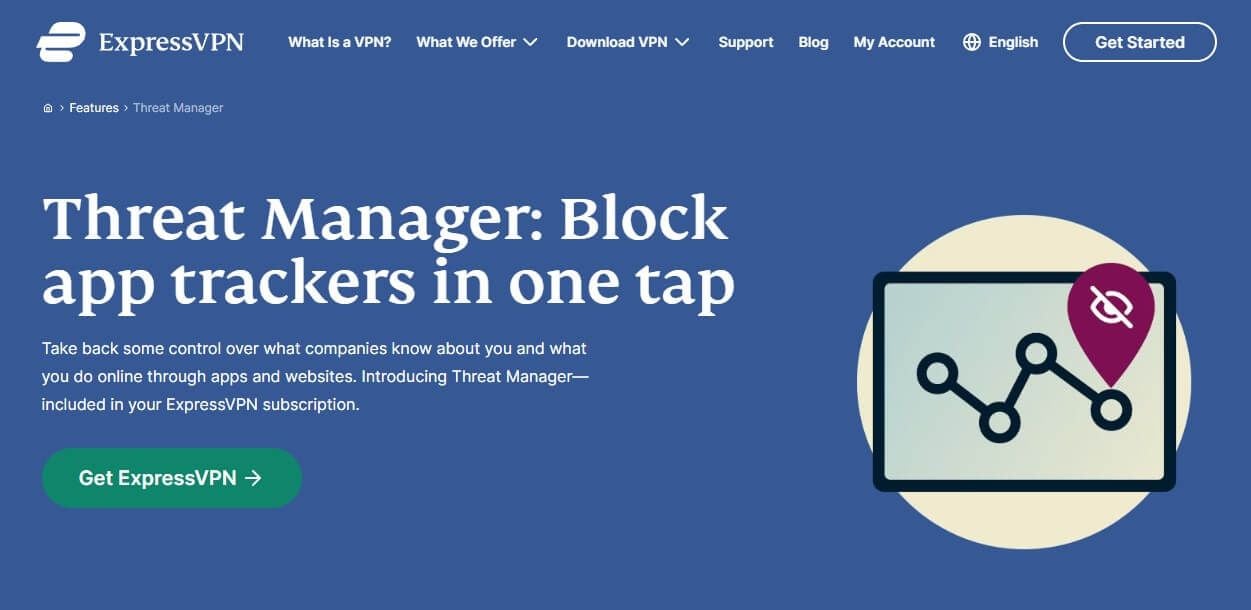
On macOS/iOS, you can do that only on websites and subdomains. Finally, on Android, you can only exclude apps from using the service. Find out more about how split tunneling works here. In terms of IP leak protection, both VPNs offer it, with the option to protect IPv6 addresses.
In the premium version, TunnelBear has an ad blocker. However, we found ExpressVPN’s equivalent to be better. It blocks ads and trackers, even including Parental Control, and blocks adult/gambling sites. Those with small children will surely value this feature more.
Another perk is obfuscation. ExpressVPN offers it with each connection as standard and it doesn’t require any turn-ons. TunnelBear offers the same feature called GhostBear, which needs enabling in Settings. OpenVPN is the protocol both providers use but not the main option.
What Are the Differences?
ExpressVPN offers Lightway. A state-of-the-art encryption protocol that outperforms all others. We’re glad that TunnelBear comes with WireGuard, which can be used on all of its apps. Moving on, ExpressVPN’s encryption actually uses SHA-512 hashing, while its rival relies on SHA-256.
TunnelBear’s ad blocker comes in the form of a browser extension – another difference. Neither of the apps offers this feature. ExpressVPN’s apps are equipped better and there’s another browser extension ExpressVPN Keys, which is a name for a password manager that TunnelBear doesn’t have.
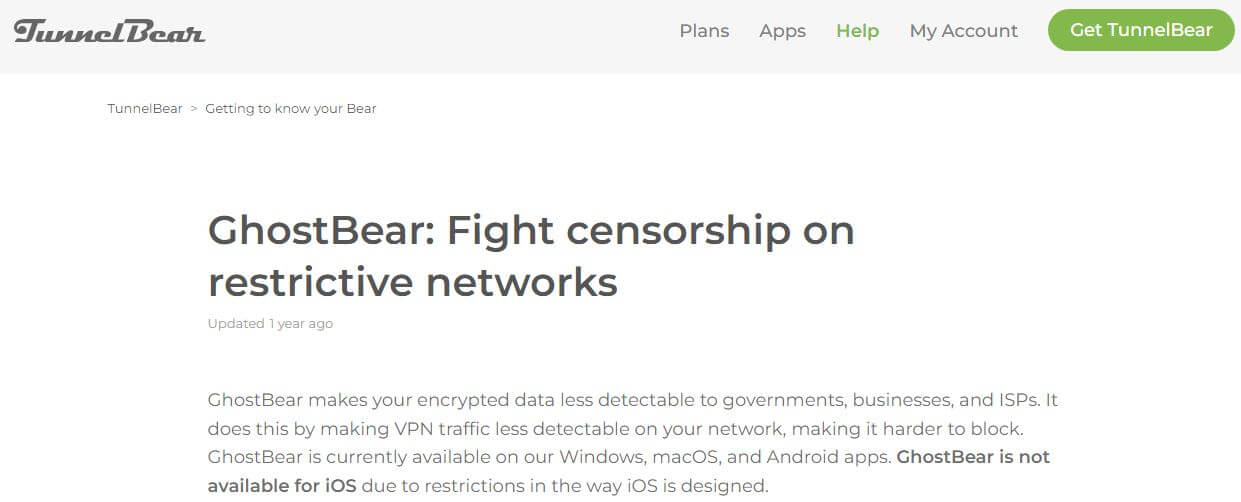
When talking about their differences, it’s worth noting that, apart from everything we mentioned, TunnelBear has no notable features. That couldn’t be said about ExpressVPN, which offers Private DNS servers and bases its entire server fleet on RAM.
RAM servers are a must-have in 2024 and they’re crucial for improving your privacy. With each restart, their data is wiped, preventing unwanted data logging. Even in 2024, TunnelBear lacks RAM servers, which inherently makes it less secure. But let’s see if its logging practices are any better.
Is There a No-Logs Policy?
Since we mentioned TunnelBear, let us start this TunnelBear vs ExpressVPN privacy policy comparison with this provider.
TunnelBear
In the screenshot of its privacy policy, we can notice that TunnelBear keeps no logs. The privacy policy is short and to the point, clearly explaining that your internet history, IP addresses, DNS queries, and other sensitive data won’t be stored.

The provider keeps only a few mandatory logs for keeping your subscription afloat. However, websites you visit, timestamps, and other bits of data are out of the game. One thing to notice is that the company is in Canada. Being a Canadian VPN, we know it’s inside the 5 Eyes jurisdiction.
On the other hand, this doesn’t seem to be a problem. So far, TunnelBear has proven to be pretty secure, with no leaking incidents akin to those of IPVanish or HideMyAss. Making things better are numerous audits that the company received in the past few years.
The last one was from Cure53, the same company that audited ExpressVPN recently. The first audit was way back in 2017 from the same company. In between, TunnelBear churned out several audits regarding its no-logs practices and the entire VPN infrastructure.
With 6 audits under its belt, all from Cure53, TunnelBear is indeed a trustworthy and safe-to-use service.
ExpressVPN
ExpressVPN’s zero-log practices are already well-known at this point. Much like TunnelBear, ExpressVPN boasts several independent audits from Cure53, PriceWaterhouseCoopers, and KPMG. At the time of writing, the number of audits is higher than that of TunnelBear.
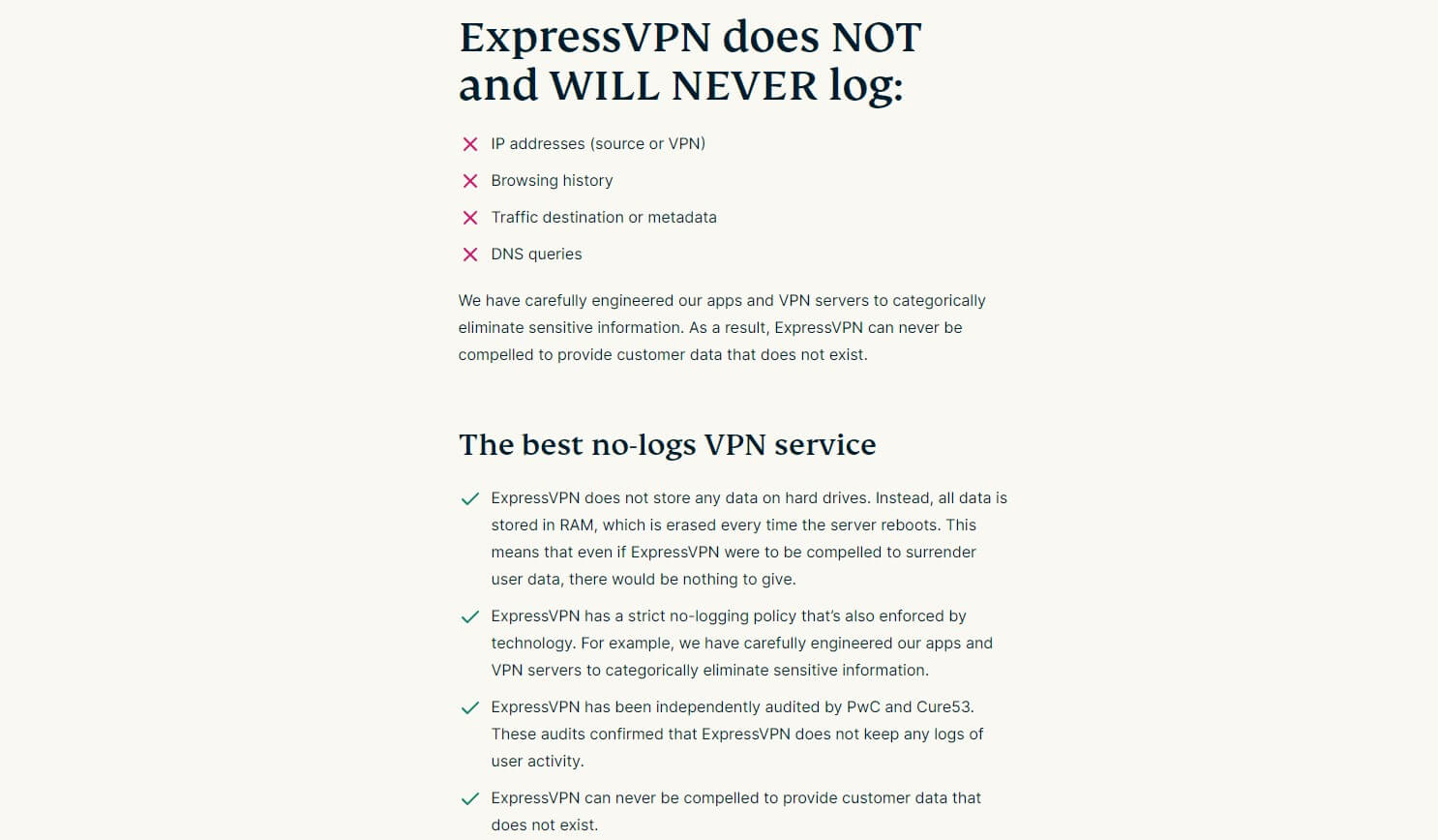
In total, the company was audited EIGHT times from 2018 to 2022 but we know there will be more. On top of that, the service resides in the British Virgin Islands. This is very important, as it’s a privacy-friendly country with zero data-retention laws, as opposed to Canada.
It’s no wonder ExpressVPN keeps no logs of users’ IP addresses, browsing history, DNS queries, and so on. We’d give this provider an advantage because of RAM-only servers and the fact it has more audits not only regarding its privacy policy but also its apps, the Lightway protocol, and the Aircove router.
Who Wins?
Okay, so which provider is more secure – TunnelBear or ExpressVPN? It’s a hard question but ExpressVPN WINS in the end. It has more audits, RAM-only servers, and way more security features that work better. However, we must praise its rival for being such a formidable opponent in this round.
ExpressVPN vs TunnelBear Streaming Test
Streaming-wise, TunnelBear isn’t very formidable. It’s atrocious, precisely. We tested TunnelBear across multiple streaming platforms but without much success. Netflix – a platform many like – won’t work properly with it. The US library works from time to time but rarely.
When using the UK server, we had difficulties unblocking BBC iPlayer as well. Thankfully, we found that many TV channels like ABC and ITV will work but they’re far less popular than a typical streaming platform. NordVPN works better than TunnelBear for streaming – no doubt.
Even the performance of this provider is subpar in regard to streaming. Its 10 Gbps servers aren’t very fast for some reason, which makes watching 4K content a bit more unenjoyable than we’d imagined. Now, when switching to ExpressVPN, things took a turn for the better.
ExpressVPN can unblock 15+ Netflix catalogs, including the most popular ones. On top of that, it’ll let you access ALL streaming services no matter the device. BBC iPlayer, Disney+, Hulu, and others will work like a charm. Heck, even the browser extension is mighty for streaming.
Do we need to mention other geo-restrictions? TV channels from the US work well in Europe and we even found that betting and gambling sites can be unblocked. Since ExpressVPN is the fastest option currently, the streaming experience is impeccable.
Full HD or 4K – doesn’t matter. You’ll be glad you bought this provider just for streaming alone. Not to mention other aspects we’ll analyze in this TunnelBear vs ExpressVPN battle.
Who Wins?
Things are clear as day at this point. ExpressVPN WINS because it’s a more optimized provider than TunnelBear for streaming. Thanks to incredible website-unblocking capabilities, you’ll avoid struggles when accessing geo-restricted streaming portals from around the world.
ExpressVPN vs TunnelBear Speed Comparison
Beating ExpressVPN at its game of performance is pretty hard. Impossible even. However, in our TunnelBear vs ExpressVPN duel, we must go through this comparison as well. To be able to do that, we’ll first show your native internet speeds.
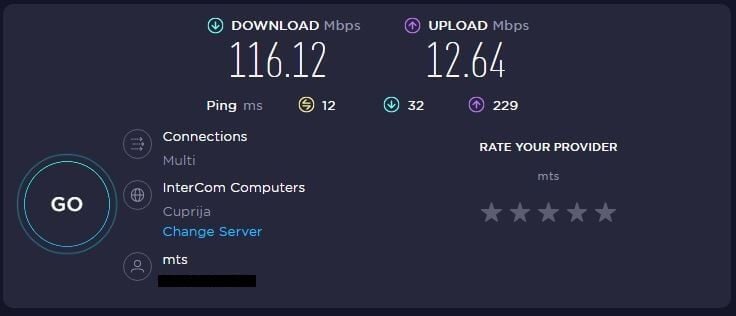
At the time of doing these tests, we were in Europe. From here, we tested TunnelBear and ExpressVPN for 3 days in a row, 3 times a day but this time, using 4 server locations. Locations-wise, we used the UK, the US, Australian, and Japanese servers.
After doing all the speed tests, we compiled the results and took only the best ones. One more thing. When setting up the protocol, we relied on the automatic option. This means we let the VPNs choose the best protocols for us, which were usually Lightway or WireGuard in ExpressVPN or TunnelBear.
Having said everything, here are our speed test results.
ExpressVPN
UK:
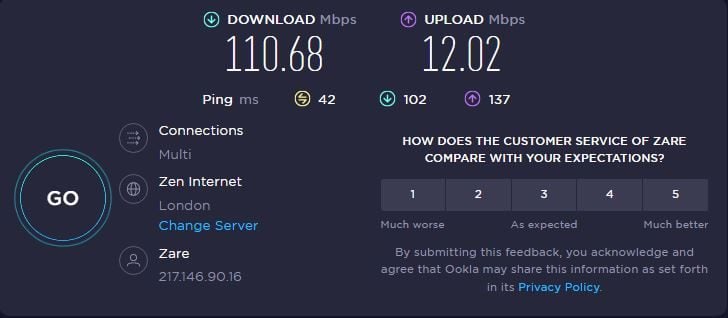
US:
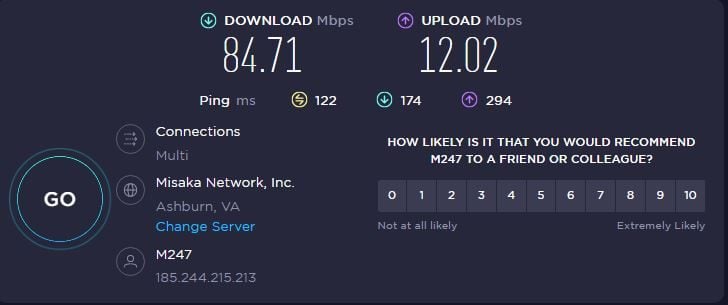
Australia:
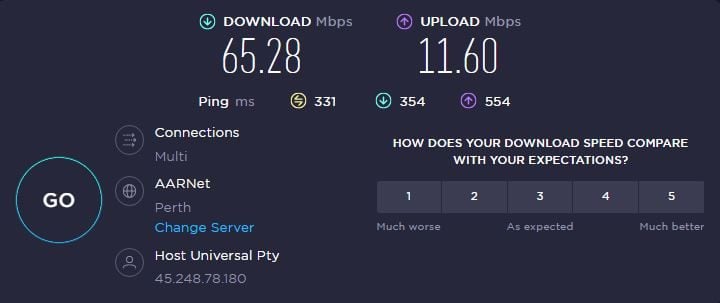
Japan:
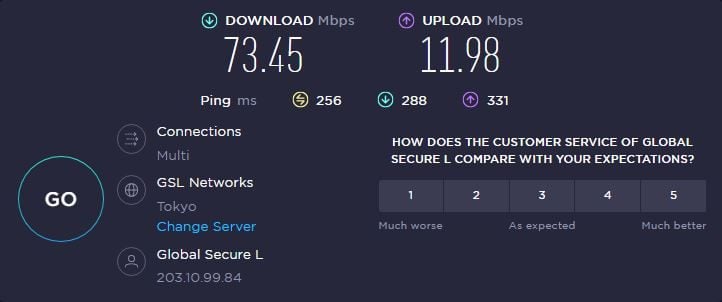
TunnelBear
UK:
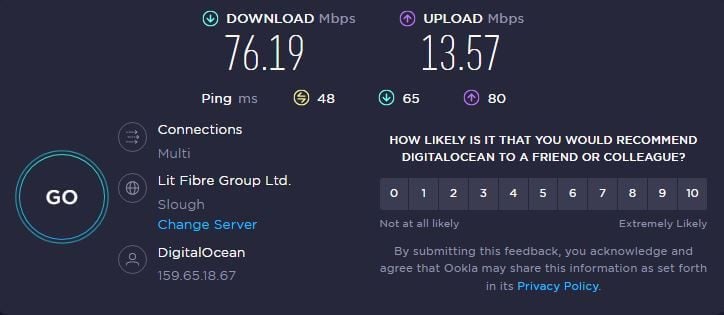
US:
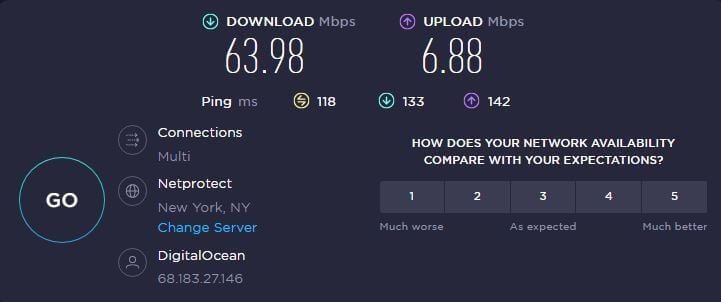
Australia:
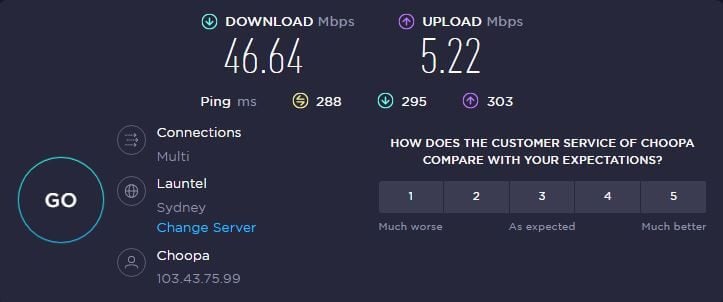
Japan:
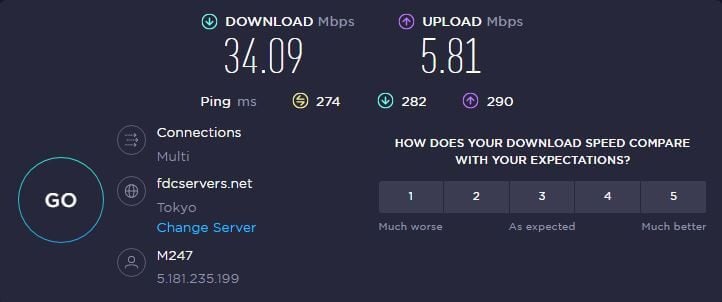
Who Wins?
First off, we need to clarify that ExpressVPN WINS this round against TunnelBear. As you can see, this is a way faster provider with excellent speeds across the board. It’s easily the fastest VPN for Australia but its top-notch performance spans other servers we tested.
TunnelBear is a snail compared to ExpressVPN. Its UK speeds, which should be very high, aren’t, although upload speeds aren’t that bad. Other than that, TunnelBear shows higher latency in most cases and reduces the overall performance by a noticeable margin, making it inferior.
Torrenting: TunnelBear VPN or ExpressVPN?
TunnelBear’s free version has one fatal flaw – it forbids torrenting. While free VPNs rarely work for P2P, paid ones always do. That’s why its paid option allows for downloading torrents. It’s good to know that the paid version isn’t an extreme performer, though.
Judging by the speed test results from above, we expected nothing more, and yet, that’s what we got. Using the closest servers still yielded speed decreases. Going overseas made things worse, especially when downloading larger files from 1337x or other sites.
TunnelBear has no P2P-optimized servers – neither does ExpressVPN. Still, we expected a tad better performance on servers overseas. Either way, downloading torrents usually means using the closest server, which, in this case, provides you with solid, not the best performance.
ExpressVPN is fast overall, so torrenting with it is a breeze. You’ll be enjoying full speed while downloading even the largest torrents. Heck, even if you’re an uploader, you’ll be getting your files online for others to download with a snap of a finger.
The provider rarely reduces your speeds, except if you’re using Australian servers. While upload speeds might suffer very little, download speeds are always on point. The service has no dedicated P2P servers either but as you can see, it practically doesn’t need them.
Who Wins?
In terms of P2P allowance, the round would be a draw. However, ExpressVPN WINS because it’s faster overall than TunnelBear and doesn’t produce dramatic speed decreases as its opponent. This applies even to long-distance servers in case you need to use them.
Are TunnelBear and ExpressVPN Working in China?
We mentioned obfuscation in this ExpressVPN vs TunnelBear duel before. If you’ve read it carefully, we concluded that both providers offer it. As per our tests, these features don’t work the same in both provides. Well, to be precise, TunnelBear’s obfuscation doesn’t phase the Great Firewall of China.
According to our numerous testers in China, the VPN fails to work miserably. Connecting to a server is impossible even with GhostBear enabled. The connection failure means you won’t be protected from surveillance and censorship in the country, which is a big deal, to be honest.
Our testers also tried to switch protocols to OpenVPN or IKEv2 but this didn’t work. ExpressVPN has no option to enable obfuscation. Instead, it’s automatically ON whenever you connect. This obfuscation works like a dream. In China, ExpressVPN is a pretty powerful Great Firewall’s foe.
It’ll work almost 10/10 times without special tweaks. Just select the server, connect to it, and voila! Important to know is that you’ll need to enable a kill switch to prevent leaks and use the Automatic protocol option to give the provider a chance to automatically optimize your connection.
In doing so, at least from our experience, the provider will have no problems in China. We talked about a similar issue in our Dubai VPN article. Here, we divulged that ExpressVPN is, again, a superior option due to its ability to get over censorship and unblock a myriad of sites.
Who Wins?
You’ll not be able to get over censorship in China with TunnelBear. That’s why ExpressVPN WINS the round against TunnelBear by offering superior obfuscation for getting around DPI, IP blacklisting, and other measures used in China and many other countries.
TunnelBear vs ExpressVPN Server Fleets
Now, it’s time to see how many servers in how many countries ExpressVPN and TunnelBear offer. Some of you might end up surprised after this comparison.
TunnelBear (5,000+ servers in ~50 countries)
Just as we mentioned surprises, did you know that TunnelBear offers 5,000+ servers in 47 or so countries? This is a LARGE provider that even gives you around 500 servers in the free version. That’s way more than Atlas VPN or ProtonVPN, for example.
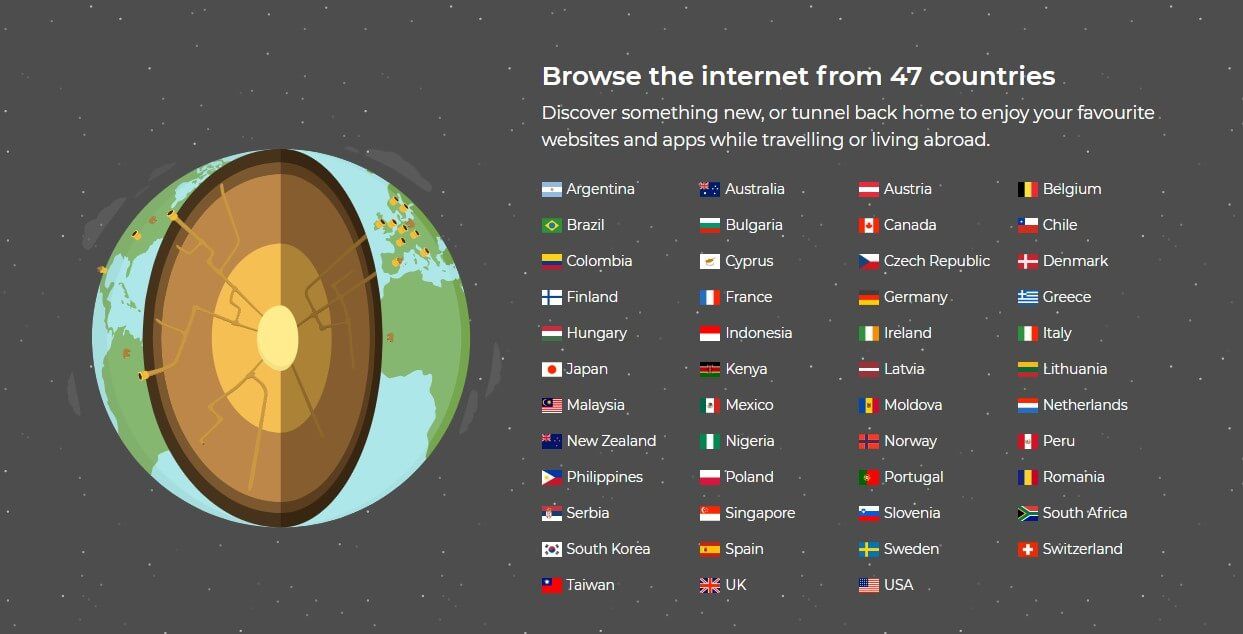
As said, TunnelBear has no specialty servers, which, in our opinion, is a missed opportunity. They could’ve included a couple of dedicated IP locations or perhaps, torrenting/streaming servers like CyberGhost. CyberGhost is excellent for Netflix because of that.
Having servers in around 50 countries, TunnelBear’s distribution is okay. It’s not out of this world and the majority of its servers are in the US, the UK, Canada, Australia, and Europe. However, you’ll find plenty of servers in Asia, Africa, and South America as well.
Additionally, the service relies on 10 Gbps servers but fails to utilize RAM servers, making the server fleet not the most cutting-edge. Still, we would be lying if we claimed we’re not thoroughly impressed with the number of servers on offer. It’s almost like NordVPN at this point!
ExpressVPN (3,000+ servers in 105 countries)
At first, you’d think ExpressVPN is inferior to TunnelBear with 3,000 servers. But hey, the VPN is present in 105 countries, which is 2 times more than its opponent. Now, the question is which is more important – the number of servers or locations. Honestly, we’d say the latter.
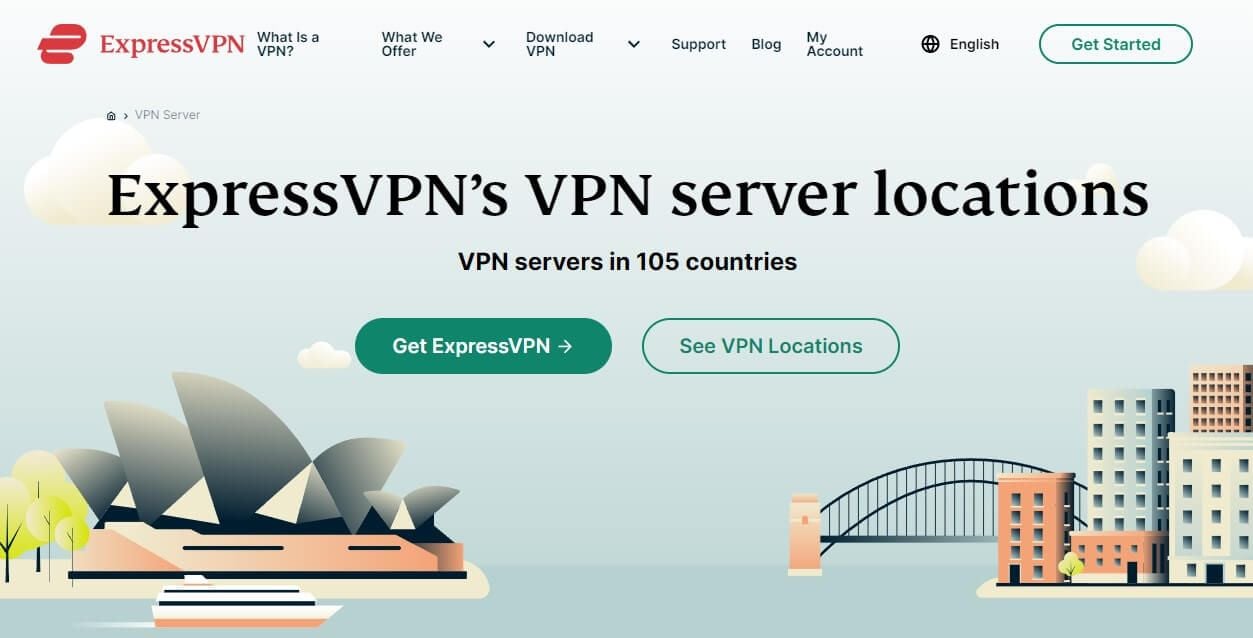
ExpressVPN covers effectively half of the globe and that’s something to behold. 3,000+ servers are more than enough, especially when they’re based on RAM and are 10 Gbps performance-wise. No specialty servers are here and dedicated IPs aren’t offered.
That isn’t a problem considering just how well these servers work. It’s like ExpressVPN devoted extreme care to every server – which we don’t doubt is the case. They work for streaming, torrenting, browsing the internet, and even wandering around the deep web or dark web.
ExpressVPN is a masterclass in server distribution too, with servers in all popular locations. Recently, the provider even upgraded its server list to include more new locations for those who need them. This tells us that the company isn’t shy of making new improvements in every aspect.
Who Wins?
TunnelBear has 2,000+ more servers than ExpressVPN. Still, we’d say that ExpressVPN WINS the round because it has 50+ more countries than TunnelBear. Not a negligible number, you’ll agree. Besides, the inclusion of RAM servers and their better capabilities make ExpressVPN a clear winner.
Customer Support: TunnelBear or ExpressVPN?
State-of-the-art customer support from ExpressVPN is rarely seen in other providers. This service has 24/7 live chat support that works flawlessly. It’s responsive, helpful, and ready to tackle your problems. In fact, it responds in around 10-15 seconds every time you contact it!
Aside from that, ExpressVPN’s email support is very fast to respond and can solve more complex problems. The provider has no phone support but let’s think about it – which VPN actually has it? Maybe Norton Secure VPN – a subpar option for privacy.
As for ExpressVPN, other support methods include FAQs, how-to guides, and the Blog section where you can read many interesting articles. TunnelBear repeats everything except one crucial feature – 24/7 live chat support. No, this VPN doesn’t offer it.
Its email support is the only way of direct contact and from our experience, it’s way too slow to respond. We don’t even think it’s working during the weekend because each time we contacted TunnelBear during this period, the company got back to us on Monday or Tuesday.
The only way to get priority support is by purchasing TunnelBear for Teams. But very few people would use a low-quality provider like this for teams/businesses. Again, you’ll find ExpressVPN better if you’re after a corporate VPN.
Who Wins?
ExpressVPN WINS yet another round today by offering way better customer support than TunnelBear. Instead of relying only on the email support service, it includes live chat support available 24/7, which is way more responsive and by extension, helpful.
ExpressVPN vs TunnelBear Pricing Comparison
Okay, so the final round of this TunnelBear vs ExpressVPN analysis is about pricing. Which provider is more expensive? Or better, which is cheaper, ExpressVPN or TunnelBear? Let us find out below.
ExpressVPN
ExpressVPN’s pricing structure is simple and it doesn’t offer a litany of plans like Surfshark and NordVPN. Instead, we have 3 subscription plans with identical prices for years now.

The best plan is the middle one. At under $6.7 a month, you’re getting 12 months + 3 free months with a whopping 49% discount. ExpressVPN isn’t the cheapest by any means but this special deal drops the price of this awesome provider quite a bit. Quality costs at the end of the day.
Its monthly plan at $12.95 is expensive, we can all agree. However, its 6-month plan at $9.99 a month sounds like a decent deal if you need a VPN only for half a year. Vital to mention is a non-conditional 30-day refund policy, which applies to all plans.
This allows you to test the service and be refunded in case you find it subpar. Albeit, that’s unlikely to happen given all of the qualities we discussed so far.
TunnelBear
TunnelBear sounds like it’s cheaper than ExpressVPN having in mind its qualities so far. But is it really the case? The screenshot below should tell you everything.

The monthly plan is cheaper at $9.99, so we’re off to a good start. Interestingly, both 1-year and 3-year plans seemingly cost the same at $3.33 a month. Since both are paid upfront, the annual plan ends up costing $39.99 for the first year, while the 3-year plan is $120.
You noticed we said “for the first year”, which means TunnelBear renewal prices are higher. To be precise, after the initial discount period expires, you’ll be charged $59.88 annually, which is around $5 a month. This is much more expensive but still more affordable than ExpressVPN.
The main downside is that TunnelBear offers NO refund policy. Instead, the cancellation and refund policy works on a per-case basis. If you have an issue the support team can’t fix, you’re eligible for a refund. However, if you don’t like the VPN and you simply want your money back, it’s not happening.
By the way, you can learn what to do if a VPN isn’t working here. Perhaps you can fix the potential problems without waiting for the support team to do that for you.
Who Wins?
TunnelBear doesn’t offer a refund policy while ExpressVPN does but it’s much more expensive. As a result, TunnelBear WINS out over ExpressVPN. Besides, it offers a 100% free plan with 2 GB a month that lets you test how the VPN works before making the final purchase.
Conclusion: ExpressVPN Wins!
After our in-depth TunnelBear vs ExpressVPN comparison, we have to do a bit of math. So, we had 9 tests so far and ExpressVPN won 8, while TunnelBear won just 1. This translates to a score of 8:1 for ExpressVPN, which emerges victorious out of the battle.
We think this result needs no special explanation or elaboration. ExpressVPN trumps its opponent by being better in virtually every aspect except for pricing. We’d give TunnelBear an advantage in simultaneous connections because it puts no limits. However, its compatibility is subpar.
Other than that, we think TunnelBear’s apps look cooler and its 5,000+ servers are more numerous than ExpressVPN’s 3,000 servers. Still, ExpressVPN has 105 countries, overwhelmingly better compatibility, faster speeds, superior streaming ability, more responsive support, and a refund policy.
The answer to the question of which one to buy – ExpressVPN or TunnelBear – is simple in the end. You should buy ExpressVPN! And if you find this provider pricier than you’re ready to pay for it, an alternative would be CyberGhost. This cheap provider is amazing – better than TunnelBear.
But if you want the creme de la creme of the VPN industry and you’ll settle for no less than nearly absolute perfection… well, you know what to do. ExpressVPN’s 49% discount and 3 free months for the annual plan are still active, so don’t miss them!